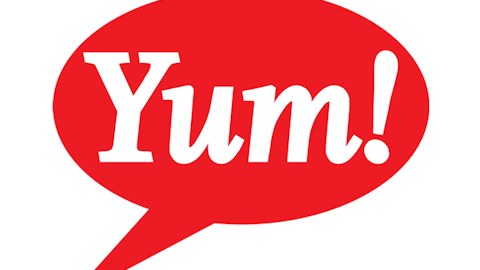There is no question about it. Yum! Brands, Inc. (NYSE:YUM)‘s earnings report came up short. For its third quarter, the restaurant chain earned $1 per share on revenues of $3.43 billion, missing earnings expectations of $1.07 per share and revenues of $3.68 billion. Yum’s China same store sales rose by just 2% year-over-year, while total China sales increased by 8% year over year. Worldwide system sales grew by 6%. Yum shares were off more than 17% in after-hours trading on Tuesday. Let’s take a closer look at the earnings report and examine what hedge funds think of the stock.

But why do we track hedge fund activity? From one point of view we can argue that hedge funds are consistently underperforming when it comes to net returns over the last three years, when compared to the S&P 500. But that doesn’t mean that we should completely neglect their activity. There are various reasons behind the low hedge fund returns. Our research indicated that hedge funds’ long positions actually beat the market. In our backtests, covering the 1999 – 2012 period, hedge funds’ top small-cap stocks outperformed the S&P 500 index by double digits annually. The 15 most popular small-cap stock picks among hedge funds also bested passive index funds by around 60 percentage points over the 36 month period beginning from September 2012 (read more details here).
Follow Yum Brands Inc (NYSE:YUM)
Follow Yum Brands Inc (NYSE:YUM)
Receive real-time insider trading and news alerts
Yum Brands’ shares sold off because analysts were expecting substantially higher China division growth and total EPS growth of 10% or more. They got low-single-digit negative China growth and total low-single-digit positive EPS growth instead. From Yum’s earning report:
“While it remains difficult to forecast China sales, we are now estimating full-year same-store sales to be low-single-digit negative. For the fourth quarter, this assumes mid-single-digit same-store sales growth for the Division, with positive same-store sales growth at KFC and negative same-store sales at Pizza Hut Casual Dining. Given a slower-than-expected recovery in China sales, particularly at Pizza Hut Casual Dining, as well as stronger foreign exchange headwinds, we now expect full-year EPS growth to be low-single-digit positive.”
It seems Yum hasn’t quite recovered from its food supplier troubles in previous years and the weakening Chinese economy is negatively impacting growth. The depreciating Yuan isn’t helping either.
Many hedge funds went long Yum Brands because they anticipated a strong rebound in Yum’s China sales. Third Point’s Dan Loeb had this to say about his Yum Brands investment in an investor letter:
“We initiated our position in the first quarter based on our view that the company was in the early stages of turning the page on recent troubles in its Chinese business. We believe this development should neutralize the largest overhang on the stock, set the stage for a dramatic profit recovery over the next 12-24 months, and change the public market narrative around long-term shareholder value-creation for the company.”
Loeb, who held 3.58 million shares via Third Point at the end of June, isn’t the only hedge fund manager bullish on Yum Brands. According to our database of around 730 elite funds, all ten of the company’s top ten shareholders either increased their position or established new positions in the stock during the second quarter. Keith Meister‘s Corvex Capital increased its position by 1,685% to 15.29 million shares. Doug Silverman and Alexander Klabin’s Senator Investment Group upped its holding by 56% to 3.5 million shares, while Ken Griffin’s Citadel Investment Group hiked its position by 477% to 1.93 million shares. James Dinan’s York Capital Management established a new stake of 1.78 million shares. Overall, a total of 59 funds reported stakes worth $4.06 billion in aggregate (representing 10.4% of the float) in the last round of 13F filings, versus 45 funds and $1.49 billion respectively a quarter earlier.
After today’s earnings report, the hedge funds that are long Yum will have to be patient for their thesis to play out. Yum Brands does have strong intrinsic value, and the Chinese economy will eventually strengthen. The Chinese stock market is now stable so a spin-off is also possible. If Yum Brands spins off Yum China as a separate entity listed on a Chinese exchange, the new division will likely garner a higher valuation and draw less political and media attention. Management could also try the asset light approach and franchise more to boost profits.
Disclosure: None





